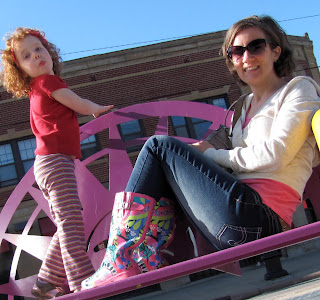By Dr. Ellaine Miller
READY? GET SET...................... GO!!!!!!!!!!!!
For the final blog entry for 2011, I thought it would be appropriate to present a few New Year’s Resolutions to consider. When making changes in your life or program/classroom, I have found that people are more successful when they choose one thing at a time to change, master that task, and then choose another thing to change. Remember, as you progress through the year with your changes, you may have to backtrack and revisit a previously mastered task and re-master it. This is OK!!!
For the final blog entry for 2011, I thought it would be appropriate to present a few New Year’s Resolutions to consider. When making changes in your life or program/classroom, I have found that people are more successful when they choose one thing at a time to change, master that task, and then choose another thing to change. Remember, as you progress through the year with your changes, you may have to backtrack and revisit a previously mastered task and re-master it. This is OK!!!
Many of the “resolutions” listed below can be broken down into smaller items to make change easier. Good luck and have the happiest and most successful New Year yet!
Take care of your self.
Do something to improve your own health and wellbeing so you have the energy and ability to care for others. When you are healthy and feeling good, you are more capable of attending to others’ needs. Try to make one or two small health-related changes as once. Pick one change, be consistent with meeting that challenge, then choose another. And, choose something realistic. Here are some suggestions that start out small and can grow into significant positive impacts on your wellbeing:
· 1. Stop drinking soft drinks (including diet drinks).
· 2. Walk purposefully for 10 minutes most days of the week. After mastery, walk 15 minutes and continue to increase until you are at 40 minutes/day most (5 out of 7) days of the week.
3. Add one fruit or vegetable to your meal/snacks daily.
+++Find one stress-causing thing in your life and eliminate or decrease its effect on you.+++
Get moving. Offer as much active play and physicality to learning as possible. Let children stand up to do their “seat” work. Encourage cross-body motion activities (like painting at the easel) to build the brain’s corpus-collosum. Play games to enhance and support learning that require children to move about the learning environment. Take children outside to play/learn. Remember, there is no bad weather, only bad clothes. (Dr. Thelma Harms)
Check out the Let’s Move campaign – http://www.letsmove.gov/ & Sesame Workshop’s Healthy Habits for Life -- http://www.sesameworkshop.org/initiatives/health/healthyhabits
Support children’s curiosity. Set up safe ways for children to explore and experience new things. Help children inquire about new things. Set them up to be scientists and explorers and “discover” new concepts. Check out Dr. Alison Gopnik’s research on infant brain development to learn more -- http://www.alisongopnik.com/
Take/make time to talk with children daily. Have meaningful, relevant conversations. Use lots of words. Build their vocabulary. Teaching children how to read by sounding out letters (phonics) and decoding is important, but if they don’t know the meaning of the words they read, it is pointless.
Check out http://www.sesameworkshop.org/inside/pressroom/tec/literacy for some compelling statistics about literacy. Our own Dr. Danny Brassell's article here earlier this month addresses this topic of parents supporting language in the everyday world of exploring together. His article is one for your files as well.
Encourage children’s self-help and problem-solving skills. Our country and world continues to need people able to address important problems and resolve issues like global warming, poverty, famine, warring nations, diseases, etc., etc. It’s important to have worker bees, but without idea people and developers, the work will either be meaningless or nonexistent. Dramatic play opportunities are important for fostering this way of thinking with young children. For more information go to http://www.pbs.org/teachers/earlychildhood/articles/dramaticplay.html
Best wishes on your resolutions for 2012!!!






































